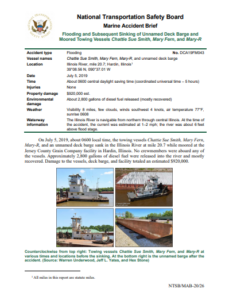NTSB issued an investigation report on the flooding and subsequent sinking of an unnamed deck barge and the moored towing vessels Chattie Sue Smith, Mary Fern, and Mary-R on Illinois River, in July 2019. The investigation highlighted issues regarding poor company oversight of inactive vessels.
The incident
On 5 July 2019, about 0600, the towing vessels Chattie Sue Smith, Mary Fern, Mary-R, and an unnamed deck barge sank in the Illinois River at mile 20.7 while moored at the Jersey County Grain Company facility in Hardin, Illinois.
No crewmembers were aboard any of the vessels. Approximately 2,800 gallons of diesel fuel discharged into the river and mostly recovered.
Damage to the vessels, deck barge, and facility totaled an estimated $920,000.
Probable cause
The National Transportation Safety Board determines that the probable cause of the sinking of the towing vessels Chattie Sue Smith, Mary Fern, and Mary-R, along with a deck barge, was the deteriorated condition of the barge and the infrequent monitoring of the vessels, which allowed the barge to flood and sink, ultimately pulling down the moored towing vessels.
Analysis
A post-salvage inspection of the deck barge revealed there were several small holes on the deck that could have allowed rainwater to collect and enter the interior compartments. Additionally, holes on the sides and on the bottom of the hull could have allowed river water to enter the barge.
Based on a review of its condition, the holes likely had been present for a significant amount of time and were the source of barge flooding.
Specifically, the side and bottom holes would have allowed water to continuously flood the barge’s compartments, which required the automatic bilge pumps to dewater the spaces at frequent intervals.
Monitoring the frequency of the bilge pump operation and developing a trend of the volume of water removed would have indicated the rate of water ingress and assisted in detecting hull leaks not easily visible.
Therefore, failure of one of the automatic submersible bilge pumps would have prevented constantly accumulating water from being removed from its compartment and resulted in the space flooding.
Lessons learned
-Company Oversight of Inactive Vessels
To protect vessels and the environment, it is good marine practice for owners and operators to conduct regular oversight and maintenance of vessel and barges, even during lay-up periods. Oversight should include periodic testing and maintenance of dewatering equipment.
Explore more herebelow:































































